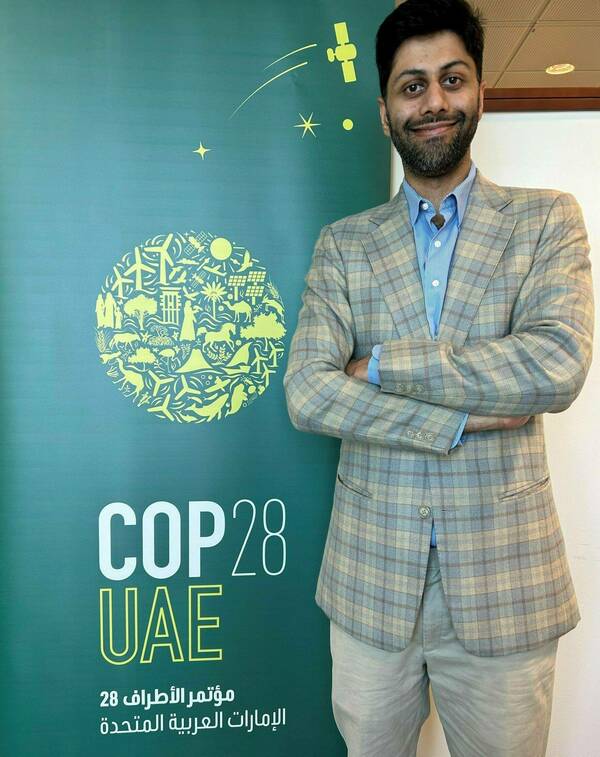Former ND-GAIN Research Associate brings food systems into focus at UN climate summit
Later this month, more than 70,000 participants will attend the UN climate summit in Dubai. In the months leading up to the summit, known as COP28, Mohammed Farrae, a Master of Global Affairs graduate (2022) from the Keough School of Global Affairs and former ND-GAIN Research Associate, has been preparing to convene key groups that will showcase climate-smart strategies for agricultural food systems. This effort is critical because agriculture contributes to climate change while simultaneously being hurt by its effects.
“Some 10 billion people will live on our planet by 2050, and collectively we must figure out a way to feed them while also protecting and restoring our ecosystems,” said Farrae, a food systems and climate specialist for COP28. “We’re bringing climate and agricultural experts into the conversation so we can reduce emissions without compromising food security and small-scale producers’ livelihoods.”
Based in Abu Dhabi, Farrae has been working to mobilize both climate and agriculture-focused organizations for a series of side events that will take place adjacent to the UN summit. Participating partners range from global research centers to financial institutions to government officials to civil society groups, and include representatives from the World Bank, the Food and Land Use Coalition; the World Resources Institute, a global research nonprofit; and CGIAR, a global research partnership dedicated to transforming food, land, and water systems. Session topics will include regenerative agricultural practices, methane emission reduction, the role of cities in food systems, malnutrition, and food waste reduction.
“The pace of innovation that we’re seeing across both sectors is encouraging, and we’re trying to maximize these events to create as much momentum as possible towards innovations with the greatest promise of scaling,” Farrae said.

Farrae joined COP28 in May after hearing about the open position from Paul Winters, Keough-Hesburgh Professor of Global Affairs. Farrae had enjoyed serving as a student research assistant for Winters, a food systems expert who serves as executive director of the Innovation Commission for Climate Change, Food Security, and Agriculture.
“Having access to Paul’s expertise, mentoring, and professional network have been transformational for me, as a student, as a research associate and now as a professional,” Farrae said.
On a personal note, Farrae also said that COP28’s location has enabled him and his spouse, Hafsa Sheikh— also a master of global affairs graduate—to live closer to their home country of Pakistan.
Farrae came to the Keough School with an academic background in mechanical engineering and experience leading a Bill and Melinda Gates Foundation-funded project focused on childhood environmental education through interactive projects focused on bee and bird rehabilitation in Pakistan. He became interested in rural food systems while working with Winters, and gained valuable research and project management skills while participating in the Keough School’s Integration Lab, (i-Lab).
“I learned how to organize a project that isn’t well-defined at the beginning, how to work closely with external and internal partners, and also learned how to use different communication styles as tools.” Farrae said. “I now use all of these skills and also am able to incorporate the multicultural perspectives of my classmates, who came to Notre Dame from around the world.”
While he’s still new to the food systems sector, Farrae is learning on the go while planning for the high-stakes international climate summit.
“It’s been challenging to develop a depth of knowledge quickly, as I’m fairly young in the food space compared to my colleagues,” Farrae said. “But the Keough School has prepared me well, and I am up for the challenge.”
Originally published by at gain.nd.edu on November 21, 2023.
Latest Research
- Biseach Symposium Strengthens Cancer Research Partnership Between Notre Dame and University of Galway…
- Notre Dame announces new research collaborations with Ukrainian Catholic UniversitySeven faculty teams of collaborators from the University of Notre Dame (South Bend, Indiana, USA) and Ukrainian Catholic University (Lviv, Ukraine) have received grants from Notre Dame Global and Notre Dame Research to pursue…
- From reaction to resolution: The future of allergy treatmentTwelve-year-old Lauren Eglite was thrilled to attend a Notre Dame football game with her father, Erik, in 2017, even though her acute peanut allergy demands constant vigilance. She was even more excited when the stadium’s brand-new video board aired an NBC Fighting…
- New Study Highlights Mother-Child Link for Anemia in The GambiaAnemia is a "silent epidemic." It affects nearly 2 billion people globally, yet many people ignore its symptoms. Typically caused by the consumption of iron-deficient foods, anemia develops gradually. Its symptoms—such as fatigue, weakness, and shortness of breath—are frequently dismissed or misattributed.
- Megan McDermott joins ND–IBM Tech Ethics Lab as new Notre Dame directorThe Notre Dame–IBM Technology Ethics Lab, a critical component of the Institute for Ethics and the Common Good (ECG) and the Notre…
- Jenkins Center for Virtue Ethics receives grant to advance love-based ethical frameworkThe University of Notre Dame has received a $10 million grant from the John Templeton Foundation to support a project titled Love and Social Transformation: Empowering Scholars and Social Innovators to Develop the Love Ethic.












